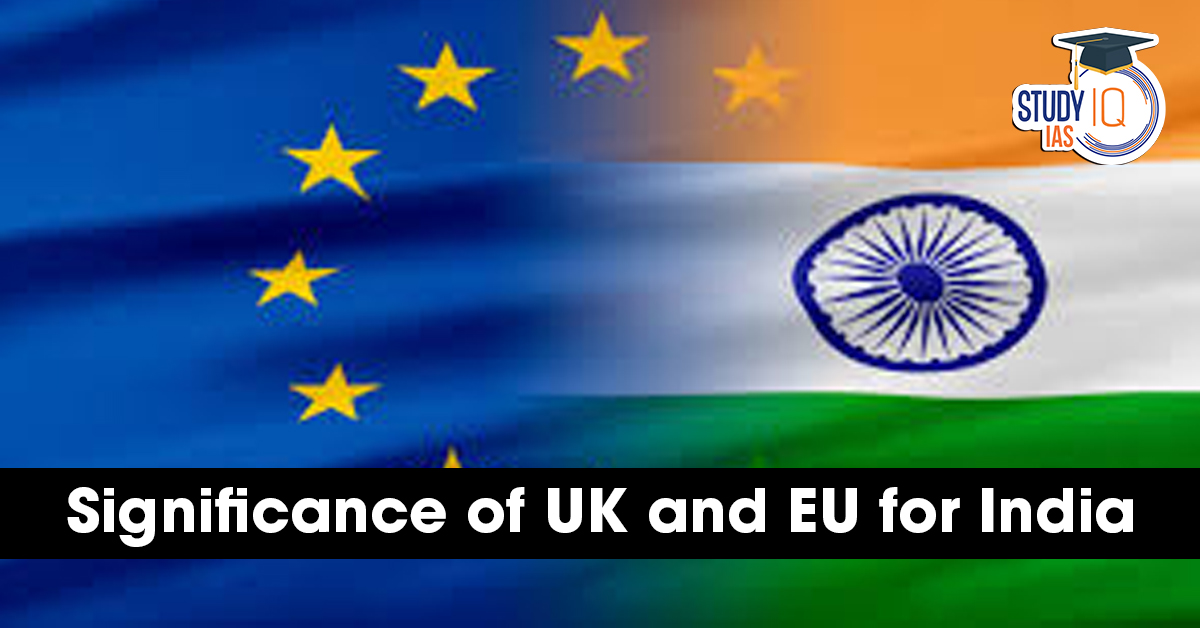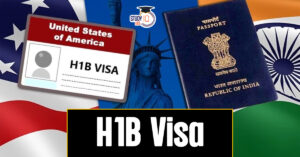Table of Contents
Context: The renewed UK-EU agreement signals more than a regional development — it has deep implications for India’s trade, diplomacy, and diaspora, demanding timely strategic responses.
Significance of UK and EU for India
- Major Trade Partners: The European Union is India’s second-largest export destination, accounting for $86 billion in exports in FY2024.
- The United Kingdom alone received $12 billion worth of Indian exports in the same fiscal year.
- Pharmaceutical Sector Dependence: India supplies over 25% of the UK’s generic drug requirements, playing a vital role in the British healthcare system.
- A unified U.K.-EU regulatory regime could streamline drug approval processes, reducing costs and boosting efficiency for Indian pharma companies.
- Seafood and Agro Exports: India’s seafood exports touched ₹60,523.89 crore (~$7.38 billion) in FY2024.
- Alignment of food safety and fisheries policies between the UK and EU can help reduce non-tariff barriers and customs delays for Indian exporters.
- Strategic and Defence Cooperation: India’s bilateral trade with France reached $15.1 billion in 2024-25.
- India has signed key defence and technology transfer agreements with France, Germany, and the UK, which can be further deepened under a coordinated UK-EU defence policy.
- Diaspora and Education Ties: The UK issued over 1,10,000 student visas to Indian nationals in 2024, placing India among the top sources of international students.
- A reset in UK-EU border policies could allow partial professional and academic mobility across both regions for Indian talent.
- Multilateral Cooperation Platforms: India maintains a Strategic Partnership Roadmap to 2025 with the EU and a Comprehensive Strategic Partnership with the UK.
- Greater UK-EU alignment could strengthen India’s position at global forums like the UN, G-20, and WTO, enhancing India’s voice on issues like climate finance, digital public infrastructure, and reforms in global governance.
Key Hurdles for India
- Regulatory Complexity Post-Brexit: Since Brexit, Indian exporters have faced the burden of complying with two distinct regulatory regimes — one for the UK and another for the EU.
- This has been especially difficult for pharmaceuticals, textiles, seafood, and agro-products, where compliance requirements are highly technical and vary by region.
- Stricter Unified Standards Could Hurt MSMEs: A harmonised UK-EU food safety and product certification regime may lead to more stringent sanitary and phytosanitary (SPS) standards.
- Eg. in 2024, the EU food safety authorities found cancer-causing chemicals found in 527 Indian food items and banned it in the market.
- Export Ecosystem Limitations: India still struggles with logistics costs, which are around 13–14% of GDP, compared to 8–9% in developed economies.
- The new EU Carbon Border Adjustment Mechanism (CBAM) has also been a point of dispute.
- Talent Mobility Constraints: After Brexit, Indian professionals faced reduced access to EU job markets due to the UK no longer being a bridge to Europe.
- While over 1,10,000 student visas were granted by the UK in 2024, professional migration opportunities into the broader EU space have remained fragmented.
- Trade Defence Measures and NTBs: The EU frequently imposes anti-dumping duties and technical barriers on Indian goods.
- Eg., India has faced anti-dumping investigations in the EU on steel, chemicals, and textiles — sectors crucial to its export profile.
- Uncertain Geopolitical Balancing: The UK-EU strategic realignment may push India to balance between transatlantic powers and its own strategic autonomy.
- India must ensure that its deeper engagement with France and Germany is not complicated by a renewed EU foreign policy bloc that expects tighter alignment on issues like Russia, China, and human rights.
Way Forward for India
- Leverage Unified Regulatory Space: Push for streamlined export approvals, especially for pharma, seafood, and textiles.
- Support MSMEs: Expand Production-Linked Incentive (PLI) and Remission of Duties and Taxes on Exported Products (RoDTEP) to enhance product quality and compliance readiness.
- Deepen Strategic Ties: Enhance trilateral initiatives with France-Germany-UK for defence and technology cooperation.
- Negotiate Mobility Pacts: Embed talent and migration agreements within UK-EU coordinated frameworks.
- Upgrade Export Infrastructure: Invest in logistics, digital compliance systems, and standards certification.
- Amplify Global Role: Use the U.K.-EU reset to build a cohesive Western support base for India’s leadership in global governance, climate action, and digital equity.


 German Chancellor Visit to India in 2026...
German Chancellor Visit to India in 2026...
 Iran Nuclear Crisis and India’s Role f...
Iran Nuclear Crisis and India’s Role f...
 H1B Visa Program, Beneficiaries, Eligibi...
H1B Visa Program, Beneficiaries, Eligibi...




















